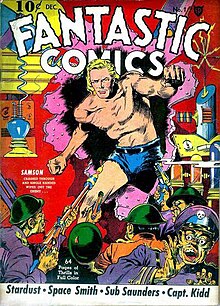

A comic book, comic-magazine or simply 'comic', is a publication that consists of comics art in the form of sequential juxtaposed panels that represent individual scenes. Panels are often accompanied by descriptive prose and written narrative, usually dialogue contained in word balloons emblematic of the comics art form.
Comic Cuts was a British comic published from 1890 to 1953. It was preceded by Ally Sloper's Half Holiday (1884), which is notable for its use of sequential cartoons to unfold narrative. These British comics existed alongside the popular lurid "penny dreadfuls" (such as Spring-heeled Jack), boys' "story papers" and the humorous Punch magazine, which was the first to use the term "cartoon" in its modern sense of a humorous drawing.
The first modern American-style comic book, Famous Funnies: A Carnival of Comics, was released in the U.S. in 1933 and was a reprinting of earlier newspaper humor comic strips, which had established many of the story-telling devices used in comics.[1] The term comic book derives from American comic books once being a compilation of comic strips of a humorous tone; however, this practice was replaced by featuring stories of all genres, usually not humorous in tone.
The largest comic book market is Japan. By 1995, the manga market in Japan was valued at ¥586.4 billion ($6–7 billion),[2] with annual sales of 1.9 billion manga books (tankōbon volumes and manga magazines) in Japan, equivalent to 15 issues per person.[3] In 2020 the manga market in Japan reached a new record value of ¥612.5 billion due to a fast growth of digital manga sales as well as an increase in print sales.[4][5] The comic book market in the United States and Canada was valued at $1.09 billion in 2016.[6] As of 2017[update], the largest comic book publisher in the United States is manga distributor Viz Media, followed by DC Comics and Marvel Comics featuring superhero comics franchises such as Superman, Batman, Wonder Woman, Spider-Man, the Incredible Hulk and the X-Men.[7] The best-selling comic book categories in the US as of 2019[update] are juvenile children's fiction at 41%, manga at 28% and superhero comics at 10% of the market.[8] Another major comic book market is France, where Franco-Belgian comics and Japanese manga each represent 40% of the market, followed by American comics at 10% market share.[9]
- ^ "A History of the Comic Book". Random History. 18 March 2008. Archived from the original on 25 May 2013. Retrieved 16 July 2014.
- ^ Schodt, Frederik (1996). Dreamland Japan: Writings on Modern Manga. Berkeley, CA: Stone Bridge Press. pp. 19-20. ISBN 978-1-880656-23-5.
- ^ "Manga, anime rooted in Japanese history". The Indianapolis Star. 2 August 1997. Archived from the original on 30 May 2018. Retrieved 29 May 2018.
- ^ "Manga sales top 600 billion yen in 2020 for first time on record". The Asahi Shimbun. 1 April 2021.
- ^ "Japan's Manga and Comic Industry Hits Record Profits in 2020". Comicbook.com. 15 March 2021.
- ^ Gilchrist, Michelle (21 July 2017). "Growing comic market reached $1.9 billion in 2016". The San Diego Union-Tribune. Archived from the original on 23 July 2017. Retrieved 28 May 2018.
- ^ Magulick, Aaron (8 October 2017). "Viz Manga Sales are Destroying DC, Marvel in Comic Market". GoBoiano. Archived from the original on 10 July 2018. Retrieved 21 August 2018.
{{cite news}}: CS1 maint: unfit URL (link) - ^ Gramuglia, Anthony (19 October 2019). "Why Manga & Comics for Kids Outsell Superheroes". Comic Book Resources. Retrieved 2 April 2021.
- ^ "French Comics In 2013 – It's Not All Asterix. But Quite A Bit Is". Bleeding Cool. Avatar Press. 1 January 2014. Archived from the original on 29 July 2018. Retrieved 6 September 2018.